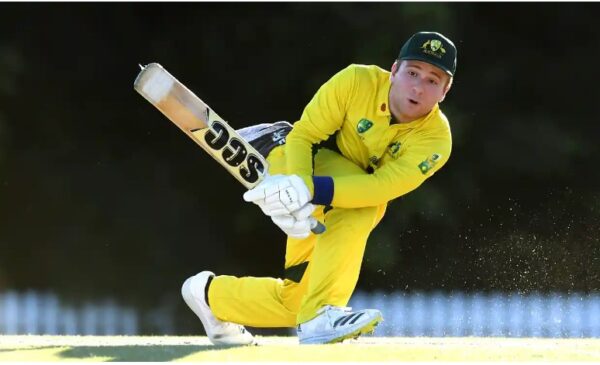Australian cricketer enters record books with 309 off 140 balls

Steffan Nero of Australia bats during the International Cricket Inclusion Series match against New Zealand in Brisbane. Photograph: Albert Perez/Getty Images for Cricket Australia
Source:Theguardian
- Blind national team player Steffan Nero betters 24-year benchmark
- Wicketkeeper-batter averages 523 at inclusion series in Brisbane
Australian blind cricket team opener Steffan Nero has smashed a longstanding world record with an astonishing unbeaten 309 off 140 balls at the International Cricket Inclusion Series.
The wicketkeeper-batter’s triple century broke the previous benchmark of 262 not out, set by Pakistan’s Masood Jan at the 1998 Blind Cricket World Cup.
“It’s a dream in itself to play for Australia so to make a century for Australia is one of those lifelong memories you will never forget,” Nero said after making his third straight century at the tournament in Brisbane.
It followed knocks of 113 (off 46 balls) and 101 not out (47), and leaves him with a scarcely believable average of 523. It also included the first six of the tournament, a magnificent reverse sweep over the ropes at Shaw Park.
“Sometimes in an over I decide, ‘OK I’m going to try to take this guy downtown and hit him out of the park’,” Nero said. “This ball hit the right spot. One of my strengths is the reverse. I’ve built that up over the years, playing that reverse sweep all the time.
“When it went over the boundary for six I was very happy with that. But I was also annoyed I hit the ball in the air, because when you verse the best nations in the world, they’ll most likely catch you.”
Needless to say, after Nero’s innings propelled his side to a total of 541-2 off 40 overs, Australia won the match by a mammoth 269 runs. The host nation leads the series against New Zealand 6-0, with two further ODIs to be played before the series concludes on Friday.
The tournament in Brisbane is the first time since 2019 that all three Australian squads – blind, deaf and intellectual disability – have competed at international level. Due to the disruption of Covid-19, Nero has not represented Australia since 2018 at the ODI World Cup in Dubai.
“It’s been a long time,” he said. “But no matter who we are playing, we always like to put in 100% and put the Australian spirit on show. All we really want to do is play cricket.”
Nero said the secret to his success was a lot of hard work and dedication. “It’s a lot of evenings, weekends, along with university and work it can be quite a lot at time,” he said. “But also the support around me. There have been days when I didn’t want to train but [coach Jason Stubbs] said ‘keep going’ and pushed me through.”
Blind cricket is much like the conventional form of the game, with a few key differences – the ball is plastic and makes a noise when it moves, and the stumps are made of metal to generate more noise when stuck by the ball. Bowling is underarm and the ball must bounce at least twice before it reaches the batter.
ODI matches are 40 overs, which takes not only a physical but also a mental toll on visually impaired players, Nero said.
“I imagine it’s a big mental strain concentrating for any fully sighted person for that length of time,” he said. “But with vision impairment we have to expend a lot more energy to concentrate, especially if the ball is moving around and the glare, it’s really hard.”
Nevertheless, after his impressive innings, Nero went on to keep wicket and promptly completed five run outs.
“It’s been a whirlwind but a fantastic experience,” he said.
… we have a small favour to ask. Millions are turning to the Guardian for open, independent, quality news every day, and readers in 180 countries around the world now support us financially.
We believe everyone deserves access to information that’s grounded in science and truth, and analysis rooted in authority and integrity. That’s why we made a different choice: to keep our reporting open for all readers, regardless of where they live or what they can afford to pay. This means more people can be better informed, united, and inspired to take meaningful action.
In these perilous times, a truth-seeking global news organisation like the Guardian is essential. We have no shareholders or billionaire owner, meaning our journalism is free from commercial and political influence – this makes us different. When it’s never been more important, our independence allows us to fearlessly investigate, challenge and expose those in power. Support the Guardian from as little as $1 – it only takes a minute. If you can, please consider supporting us with a regular amount each month. Thank you.







